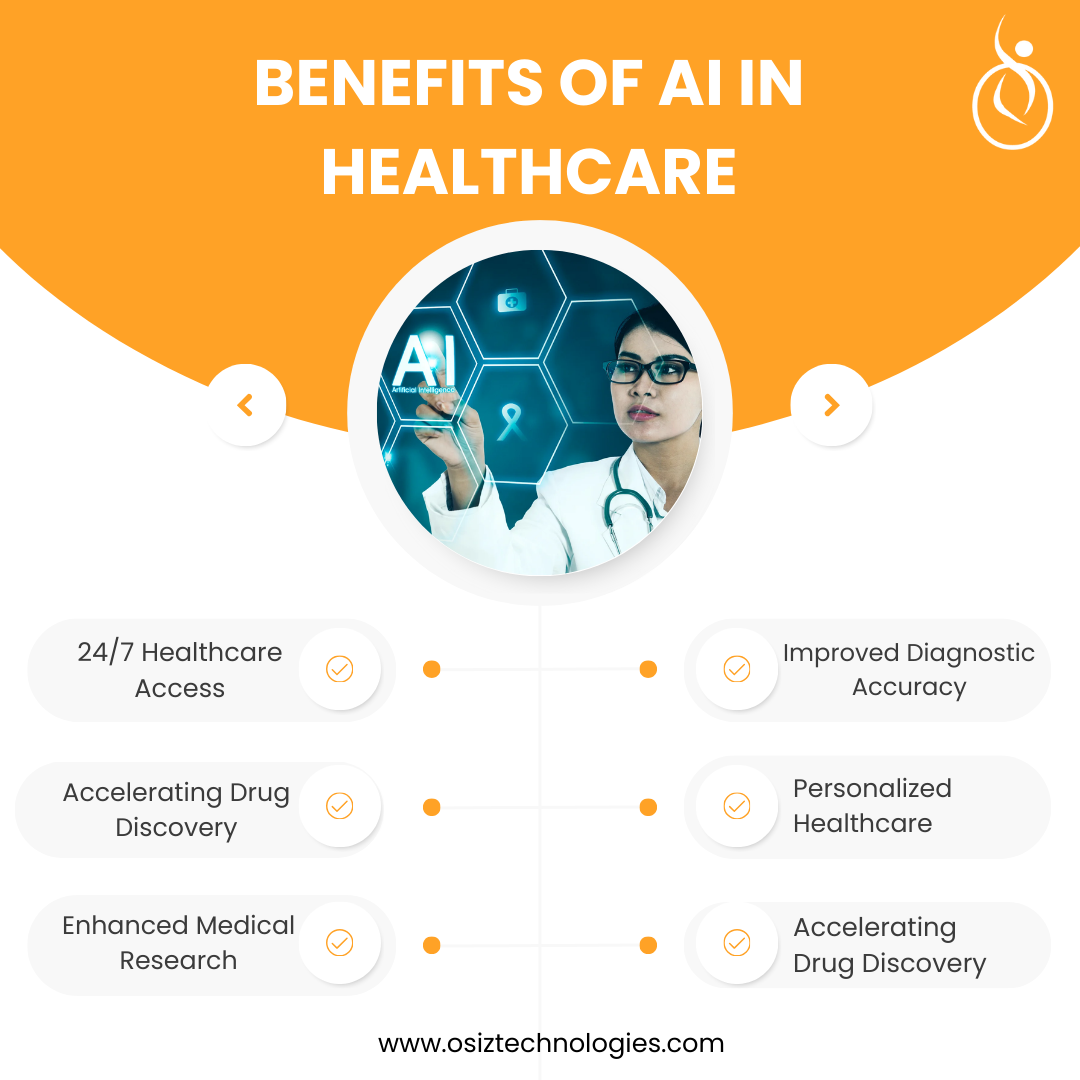AI in healthcare is transforming the medical landscape by improving patient outcomes, enhancing diagnostic accuracy, and streamlining healthcare processes. The power of artificial intelligence (AI) is undeniable, and its potential to revolutionize healthcare is immense. However, with these opportunities come challenges that need to be addressed to fully realize the benefits of AI in healthcare. In this blog, we’ll explore the benefits and challenges of integrating AI into healthcare systems.
Benefits of AI in Healthcare
1. Improved Diagnostic Accuracy
AI in healthcare is already proving to be a game-changer when it comes to diagnostic accuracy. Machine learning algorithms can analyze vast amounts of medical data, including medical imaging, lab results, and patient histories, with incredible precision. This allows AI systems to detect conditions like cancer, heart disease, and diabetes earlier than traditional methods, leading to faster and more effective treatments. AI can assist doctors by identifying patterns that may not be immediately apparent, reducing the chances of misdiagnosis.
2. Personalized Healthcare
One of the most significant advantages of AI in healthcare is its ability to tailor treatments to individual patients. AI systems can analyze a patient’s genetic information, lifestyle, and medical history to create personalized treatment plans. This level of precision not only ensures that treatments are more effective but also helps reduce side effects by selecting the most appropriate interventions for each patient.
3. Streamlining Healthcare Administration
Healthcare providers often face administrative burdens that take up valuable time and resources. Artificial intelligence for healthcare can automate routine tasks such as scheduling appointments, processing insurance claims, and maintaining patient records. By freeing up time from these tasks, healthcare professionals can focus more on patient care. Additionally, AI-powered virtual assistants and chatbots are enhancing patient interaction by providing quick responses to common questions, improving the overall healthcare experience.
4. Predictive Analytics and Preventative Care
AI’s predictive capabilities are a significant asset in healthcare. By analyzing patient data and recognizing patterns, AI systems can predict potential health issues before they become severe. This enables healthcare providers to take preventive measures, reducing the need for costly treatments and hospital visits. For example, AI can help predict the likelihood of heart attacks, strokes, or complications in chronic conditions, allowing for early intervention that can save lives.
5. Accelerating Drug Discovery
AI is accelerating the drug discovery process by processing and analyzing vast datasets much faster than traditional methods. By identifying potential drug candidates and predicting how they interact with the body, AI is helping researchers develop new medications more quickly and efficiently. This can significantly shorten the time it takes to bring new treatments to market, which is especially crucial in the fight against urgent health crises like cancer or viral outbreaks.
Challenges of AI in Healthcare
1. Data Privacy and Security
AI in healthcare relies on massive amounts of personal health data, raising concerns about data privacy and security. Protecting sensitive information from breaches and unauthorized access is a top priority. Healthcare providers must implement robust cybersecurity measures to ensure that patient data remains secure. Any vulnerabilities in AI systems could lead to privacy violations, which is why strict data protection regulations and protocols must be in place.
2. Ethical Considerations and Bias
AI systems are only as good as the data they are trained on. If the data used to train AI models is biased, the AI could produce inaccurate results, leading to unequal treatment or misdiagnosis. Ensuring that AI systems are trained on diverse, representative data is critical to avoiding these biases. Furthermore, there are ethical concerns about the role AI plays in decision-making in healthcare. Should AI have a say in life-or-death decisions, or should it merely assist healthcare providers in making these choices?
3. Regulatory and Compliance Challenges
The integration of AI for healthcare raises numerous regulatory challenges. Healthcare systems are highly regulated, and ensuring that AI tools comply with local laws and medical guidelines is vital. Regulatory bodies must develop clear frameworks for the approval and monitoring of AI technologies in healthcare to ensure their safety and effectiveness. Navigating these regulations can be time-consuming and expensive, especially as AI technology continues to evolve rapidly.
4. Integration with Existing Healthcare Systems
One of the biggest challenges in implementing AI in healthcare is integrating it with existing systems. Many healthcare providers still use outdated infrastructure, which can make adopting new AI technologies difficult. For AI to be truly effective, it must work seamlessly with existing Electronic Health Records (EHRs) and other healthcare systems. Transitioning to AI-based solutions requires significant investment in both technology and staff training, which may be a barrier for some institutions.
5. Cost and Accessibility
Although AI has the potential to reduce costs in the long run, the initial investment required to implement AI technology can be substantial. Small healthcare practices or hospitals in underserved areas may struggle to afford these technologies. Additionally, there is the risk that AI-driven healthcare innovations may not be accessible to all populations, especially those in rural areas or in lower-income communities. Ensuring that AI benefits are distributed equitably is a challenge that must be addressed to prevent widening healthcare disparities.
Conclusion
AI in healthcare offers remarkable benefits, from improving diagnostic accuracy to creating personalized treatment plans and accelerating drug discovery. The potential to revolutionize patient care and healthcare systems worldwide is undeniable. However, the challenges of data privacy, ethical concerns, regulatory hurdles, integration issues, and cost need to be carefully managed to ensure that AI is used responsibly and effectively.
As AI continues to evolve, collaboration between healthcare providers, AI developers, and regulatory bodies will be essential to navigate these challenges. By addressing these concerns and fostering innovation, AI can ultimately unlock new possibilities for better patient care, increased efficiency, and a more sustainable healthcare system.





Comments